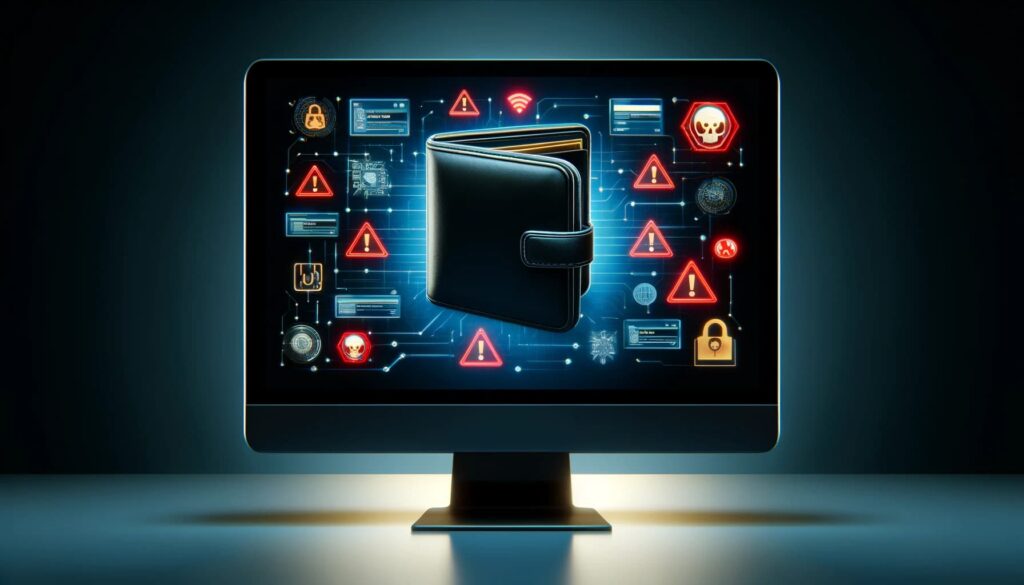Crypto Wallet Backup Tips
Welcome to our newest blog post where we unravel the essential Crypto Wallet Backup Tips you need to secure your digital assets. In the dynamic world of cryptocurrency, safeguarding your investments requires more than just strong passwords; it demands a robust backup strategy. Whether you're a seasoned trader or a novice enthusiast, ensuring you have a secure backup of your crypto wallet is paramount to protect against data loss and unauthorized access. Join us as we delve into proven backup practices, explore top tools, and empower you to fortify your digital wealth against unforeseen mishaps.
Cryptocurrency has gained immense popularity and adoption worldwide due to its rising value and global nature. As the value of cryptocurrencies continues to surge, it has become imperative to address the need for robust security measures to protect these digital assets and the transactions associated with them.

One of the significant factors that contribute to the need for security in cryptocurrency is the rising value of these currencies. Bitcoin, for example, has experienced exponential growth in its value, attracting the attention of investors and potential hackers. With the increasing value, cryptocurrencies have become lucrative targets for cybercriminals who exploit vulnerabilities to gain unauthorized access and steal funds.
The global nature of cryptocurrencies also adds to the demand for enhanced security. Unlike traditional currencies, cryptocurrencies are not bound by any geographical limitations, making them easily accessible to individuals across the globe. However, this global nature also implies that security measures need to be globally scalable and effective in protecting these digital assets from cyber threats originating from anywhere in the world.
Nevertheless, achieving security in cryptocurrency poses unique challenges due to its decentralized nature. Unlike traditional banking systems, cryptocurrencies operate on a decentralized network of computers known as a blockchain. While this decentralized architecture ensures transparency and eliminates the need for intermediaries, it also creates inherent security vulnerabilities. Hackers can exploit weak points in the network, attack individual nodes, or attempt a 51% attack to manipulate the transactions and compromise the overall security of the cryptocurrency system.
Therefore, as the value and global nature of cryptocurrencies continue to rise, the need for robust security measures becomes paramount. However, achieving this security is highly challenging due to the decentralized nature of cryptocurrencies, which necessitates innovative solutions to address the vulnerabilities and protect the growing cryptocurrency ecosystem.
The Importance Of Backing Up Crypto Wallets
Backing up crypto wallets is crucial for ensuring the security and integrity of digital assets in the cryptocurrency world. With the increasing popularity of cryptocurrencies and the growing adoption of digital wallets, the need to protect these valuable assets from potential threats is becoming paramount. Losing access to a crypto wallet, whether due to physical damage, theft, or simply forgetting a password, can result in irreversible loss of funds. Therefore, having a robust backup strategy is essential to safeguard one's investments and ensure peace of mind.
One of the primary reasons why backing up crypto wallets is crucial is the decentralized nature of cryptocurrencies. Unlike traditional financial institutions where funds can be easily recovered, cryptocurrencies operate on a decentralized network, making it nearly impossible to retrieve lost or stolen funds without proper backups. The private keys that grant access to a user's digital assets are stored within the wallets themselves, and if these keys are lost or compromised, the associated funds are essentially lost forever. By creating regular backups of crypto wallets, users can secure their private keys and have a fail-safe mechanism in place to restore their wallets in the event of any mishap. Whether it's making physical copies of private keys or utilizing secure digital storage solutions, backing up crypto wallets is an essential practice for any cryptocurrency holder.
Importance of Backing Up
Backing up a cryptocurrency wallet is of utmost importance to ensure the security of one's digital assets. As cryptocurrencies are decentralized and operate on a blockchain, they do not have a central authority to restore lost or stolen funds. Therefore, it is crucial to have a backup in place to protect against potential risks.
The key steps to properly back up a cryptocurrency wallet involve the following measures. Firstly, one should ensure to regularly create an encrypted backup of the wallet's private keys or seed phrase. This can typically be done through the wallet software or hardware wallet used to store the cryptocurrencies. Secondly, it is essential to store the backup on an offline or cold storage device, such as a USB drive or a paper wallet. This offline storage method reduces the vulnerability to online threats like hacking or malware attacks. Additionally, it is advisable to make multiple copies of the backup and store them in different secure physical locations.
The significance of securely storing the backup cannot be overstated. If the backup gets lost, whether due to theft, damage, or negligence, there is a potential permanent loss of the cryptocurrency holdings. As private keys or seed phrases are the only access to the funds, losing the backup means losing the ability to retrieve or transfer the assets. Therefore, it is crucial to take precautions like encrypting the backup, keeping it away from potential physical or digital threats, and regularly updating the backup to ensure its security.
Backing up a cryptocurrency wallet is vital to safeguard digital assets. By following the key steps and securely storing the backup, individuals can protect themselves from potential permanent losses that could occur if the backup is lost. Taking these precautions is crucial to maximize security and peace of mind while dealing with cryptocurrencies.
Why It Is Crucial To Backup Crypto Wallets
Backing up crypto wallets is crucial for multiple reasons. Firstly, it helps prevent the potential loss or theft of digital assets. Cryptocurrencies operate on decentralized networks, making them susceptible to various risks such as hacking, malware attacks, or technical glitches. Without proper backups, a user may permanently lose their digital assets if their wallet is compromised or inaccessible.
Secondly, having regular backups allows for the recovery of funds in case of any unfortunate events. If a wallet becomes corrupt or inaccessible, a backup provides an alternative source to restore the wallet and regain access to the funds. This ensures that users can recover their assets and continue using them without any disruptions.
Moreover, routine backup maintenance is of utmost importance. Cryptocurrency holdings are dynamic, with transactions occurring frequently. Failing to regularly update the backup can result in the loss of recent transactions or changes in wallet data. By maintaining a routine approach to backup, users can ensure that their backup remains up to date and accurately reflects their current holdings.
Backing up crypto wallets is essential for loss prevention, theft protection, and the overall security of digital assets. With proper backups in place, users can recover their funds in case of any issues and protect themselves from permanent losses. Regular backup maintenance ensures that backups reflect the most recent transactions and data, providing users with peace of mind regarding the safety of their crypto assets.
Risks Associated With Not Having A Backup
Not having a backup for your important files and data can pose various risks and consequences. In today's digital age, where technology has become an integral part of our lives, the loss of data can have significant implications both personally and professionally. From the potential loss of cherished memories and personal documents to the disruption of business operations and financial costs, the risks associated with not having a backup should not be underestimated. In the following sections, we will explore some of the key risks that individuals and organizations may face by neglecting the importance of having a reliable backup system in place.
Types of Wallets
There are several types of crypto wallets available in the market, each offering its own set of features and functionalities.
Hardware wallets are physical devices that store your private keys offline, providing maximum security for your cryptocurrencies. They are typically small, portable devices that can be connected to your computer or mobile phone when you need to make transactions. The main advantage of hardware wallets is that they keep your private keys secure, even when connected to an infected device. However, they can be expensive and may not be as convenient to use as other types of wallets.
Software wallets, on the other hand, are applications or programs that can be installed on your computer or mobile phone. They store your private keys digitally and allow you to manage your cryptocurrencies. Software wallets are usually free and easy to use, but they are more vulnerable to online threats, such as hacking or malware attacks.
Paper wallets are physical printouts or handwritten documents that contain your private keys. They offer a completely offline storage solution for your cryptocurrencies, making them highly secure. However, they can be easily damaged or lost if not properly stored or protected.
Mobile wallets are apps that you can install on your smartphone and use to manage your cryptocurrencies on the go. They offer convenience and accessibility, allowing you to make transactions anytime and anywhere. However, they may not provide the same level of security as hardware or paper wallets.
Each type of crypto wallet has its own advantages and disadvantages. Hardware wallets provide maximum security but can be costly, software wallets are easy to use but more vulnerable to online threats, paper wallets offer offline security but may be easily damaged or lost, and mobile wallets provide convenience but may lack the same level of security as other types of wallets.
Overview of different types of crypto wallets
Cryptocurrency wallets are digital tools used to store and manage digital assets like Bitcoin, Ethereum, or any other cryptocurrency. There are several types of crypto wallets available, each with its own features and characteristics.
1. Hardware Wallets: These physical devices store cryptocurrency offline. They are highly secure because they are not connected to the internet when not in use. The private keys are generated and stored within the device, ensuring superior protection against hacking attempts.
2. Software Wallets: These wallets exist as software applications that can be installed on computers or mobile devices. They offer convenience and easy access to stored cryptocurrencies. Software wallets can be further categorized as hot wallets or cold wallets. Hot wallets are connected to the internet and are more susceptible to cyber threats, whereas cold wallets store private keys offline.
3. Paper Wallets: Considered one of the most secure options, paper wallets involve printing the private keys and QR codes on a physical piece of paper. They provide cold storage and are immune to hackers as they are not stored digitally. However, paper wallets can be easily misplaced or damaged, requiring users to maintain utmost care and backup options.
4. Mobile Wallets: These wallets are specifically designed for use on mobile devices like smartphones or tablets. They offer versatile accessibility, allowing users to manage their digital assets on the go. Mobile wallets can be either hot or cold, depending on their connection to the internet.
Crypto wallets are essential tools for effectively managing and securing digital assets. Each type of wallet has its own unique characteristics and it is crucial for users to choose the one that best suits their needs and priorities.
Importance Of Choosing The Right Wallet
Choosing the right wallet for backup purposes is crucial in ensuring the security and accessibility of your digital assets. As more individuals rely on cryptocurrencies for their financial transactions, the need for a reliable and efficient backup system becomes increasingly important. A wallet serves as the digital equivalent of a physical wallet, allowing users to store, manage, and access their cryptocurrencies. However, not all wallets are created equal, and it is essential to consider several factors when selecting a backup wallet. In this article, we will explore the significance of choosing the right wallet for backup purposes and discuss key considerations to ensure the safety and convenience of your digital wealth.
Hardware Wallets
Hardware wallets are specialized devices that provide an extra layer of security for cryptocurrency assets. Unlike software wallets that are stored on a computer or mobile device, hardware wallets offer increased security and protection against cyber attacks.
One of the main advantages of hardware wallets is their ability to store private keys, the crucial information needed to access and manage cryptocurrencies, offline. By keeping these keys securely isolated and disconnected from the internet, hardware wallets significantly reduce the risk of malware or hacking attempts. This offline storage also helps protect against phishing attacks, where malicious actors try to deceive users into revealing their private keys or sensitive information.
Another advantage of hardware wallets is their resistance to software vulnerabilities. Since they are separate physical devices, they are not susceptible to malware or viruses that could infect a computer or mobile device. This makes hardware wallets a reliable solution for storing large amounts of cryptocurrency, as they provide an extra layer of protection to ensure the security of funds.
Furthermore, hardware wallets often include additional security features such as PIN codes and passphrase encryption. These measures further enhance the security of the wallet and ensure that only the authorized user has access to the stored cryptocurrencies.
Hardware wallets offer increased security and protection against cyber attacks compared to software wallets. Their offline storage of private keys, resistance to software vulnerabilities, and additional security features make them an ideal choice for users looking to secure their cryptocurrency assets.


